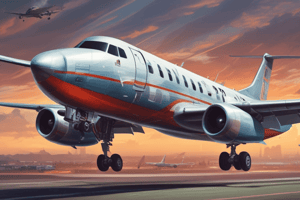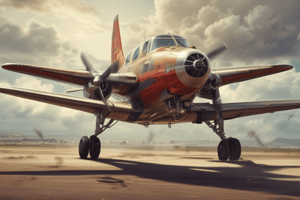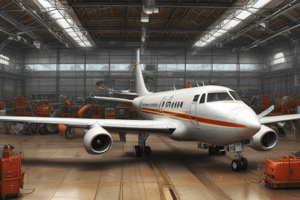Podcast
Questions and Answers
Which FAA-defined term refers to equipment that may be inoperative under certain conditions?
Which FAA-defined term refers to equipment that may be inoperative under certain conditions?
- Inoperative
- MEL (correct)
- No-Go
What should be done if a piece of Emergency Equipment is found to be deficient during the pre-flight check?
What should be done if a piece of Emergency Equipment is found to be deficient during the pre-flight check?
Notify Flight Deck immediately and document on Cabin Condition Report.
No-GO items refer to all equipment related to airworthiness and operating regulations of the aircraft that are not listed on the __.
No-GO items refer to all equipment related to airworthiness and operating regulations of the aircraft that are not listed on the __.
MEL
Match the following pre-flight check main areas with their respective aircraft models:
Match the following pre-flight check main areas with their respective aircraft models:
What is the purpose of a Biohazard Kit?
What is the purpose of a Biohazard Kit?
What items are included in a Biohazard Kit?
What items are included in a Biohazard Kit?
Wheelchair Pouches are secured under the last row of ______________ seats.
Wheelchair Pouches are secured under the last row of ______________ seats.
What is the purpose of the Emergency Locator Transmitter (ELT)?
What is the purpose of the Emergency Locator Transmitter (ELT)?
How is the Large ELT activated?
How is the Large ELT activated?
The Small ELT automatically activates within seconds of being submerged in water.
The Small ELT automatically activates within seconds of being submerged in water.
What is the primary function of the Survival Kit provided onboard?
What is the primary function of the Survival Kit provided onboard?
Match the following aircraft with their associated Life Raft capacity:
Match the following aircraft with their associated Life Raft capacity:
What are the two types of Portable Oxygen Bottles used by Frontier?
What are the two types of Portable Oxygen Bottles used by Frontier?
What is the flow rate for the High level of a Single Outlet Portable Oxygen Bottle (POB)?
What is the flow rate for the High level of a Single Outlet Portable Oxygen Bottle (POB)?
Water Extinguisher is used to extinguish class _ fires only.
Water Extinguisher is used to extinguish class _ fires only.
Halons can be used on electrical fires.
Halons can be used on electrical fires.
Match the class of fire with the appropriate extinguisher:
Match the class of fire with the appropriate extinguisher:
What temperature will the Lavatory Automatic Halon Fire Extinguisher discharge at?
What temperature will the Lavatory Automatic Halon Fire Extinguisher discharge at?
To access the Lavatory Fire Extinguisher for preflight, push on the door to open, disengaging the _.
To access the Lavatory Fire Extinguisher for preflight, push on the door to open, disengaging the _.
What indicates smoke detection in the lavatory?
What indicates smoke detection in the lavatory?
Match the Flight Deck emergency equipment with their descriptions:
Match the Flight Deck emergency equipment with their descriptions:
What must Flight Attendants understand about Crew Fixed Oxygen?
What must Flight Attendants understand about Crew Fixed Oxygen?
Flashcards are hidden until you start studying
Study Notes
Emergency Equipment
- MEL (Minimum Equipment List): A list of equipment that can be inoperative under certain conditions and still provide an acceptable level of safety.
- Inoperative: A system or component that has malfunctioned and cannot accomplish its intended purpose.
- No-Go Item: Equipment related to airworthiness and operating regulations that must be operative or repaired before normal operation.
Flight Attendant Documentation
- When a piece of emergency equipment is found to be deficient or used in-flight, notify the Flight Deck immediately and document on the Cabin Condition Report.
Emergency Equipment Location
- A320: Under each FA jumpseat, FWD OHB, AFT OHB, Lavatories, and Flight Deck.
- A321: Under each FA jumpseat, FWD OHB, AFT OHB, Lavatories, Doors 2R & 2L, and Flight Deck.
- A321NEO: Under each FA jumpseat, FWD OHB, AFT OHB, Lavatories, Doors 2R & 2L, and Flight Deck.
Pre-flight Check
- Divide the cabin into zones for emergency equipment pre-flight check.
- Each Flight Attendant is responsible for one zone.
- A320: 4 zones, A321: 5 zones, A321NEO: 5 zones.
General Safety Checks
- Lavatory: Check for items that don't belong, ensure toilet and water systems are functioning, and trash flaps are secured.
- Galley: Inventory supplies, ensure all cleats and carts are present and functional.
- FAP and PA & Interphone: Test calling functions and ensure lights are bright.
Emergency Equipment Pre-flight Check
- T.O.S.S.: Is it there? Is it operational? Is it sealed? Is it secured?
Flight Attendant Jumpseat
- One per working Flight Attendant with a seatbelt/shoulder harness that is not frayed, torn, or in disrepair.
Flashlights
- Used in evacuations or power failures only.
- 4 hours of continuous use.
- LED Flashlight: Under each FA jumpseat.
Crew Life Vest
- One in compartment under each FA jumpseat (orange/yellow).
Manual Release Tool (MRT)
- Used for opening PSU if masks fail to drop during a decompression.
- One under each FA jumpseat.
Slide Pack
- Used in evacuations only.
- Inflates in 4-6 seconds.
- A320: 4, A321: 4, A321NEO: 4.
- Secured in slide casing attached to the door.
Overwing Exit
- A320: Rows 12 & 13, A321NEO: Rows 18 & 19.
- Check window seals, opening controls, markings, placards, signs, and lights.
Flight Attendant Supply Drawer
- Used to hold supplies.
- One in AFT Galley.
- Not a required item for flight departure.
Biohazard Kit
- Located in the Flight Attendant Supply Drawer.
- Used when dealing with potential biohazard items.
- Contains protective gear, wipes, and solidifier agent.
Seat Cushions
- One for each customer seat.
- Secured by Velcro to seat frame.
Airbag Seat Belt
- Restrictions for aircraft equipped with airbag seatbelts in Row 1:
- No seat belt extensions.
- No lap children.
- No child restraint devices.
- No animals on lap.
- No pets in carriers.
- No cabin seat baggage.
Seat Belt Extension
- A320: 6, A321: 16, A321NEO: 17.
- Located in FWD OHB, AFT OHB, and Galley.
- Demo equipment includes seatbelt extension, oxygen mask, safety information card, and demo life vest.
Total Seat Belt Extensions
- A320: 9 Total (Extensions + Demo).
- A321: 12 Total (Extensions + Demo).
- A321NEO: 21 Total (Extensions + Demo).
- If the aircraft does not have enough seat belt extensions, inform the Captain so Maintenance can be advised.### Emergency Equipment
- Onboard wheelchair:
- Used to provide mobility for customers with disabilities
- Instructions in FAM 35.15
- Located in AFT OHB, A/C Right
- Wheelchair belts/straps:
- Two sets containing two belts each
- Located in AFT OHB, A/C Right, above EMK
- Secured in Velcro pouch affixed to wall of OHB
Cabin Stowage for Wheelchair-Straps
- Position wheelchair in last row with handles toward the window
- Attach one red belt to window seat seatbelt, weave ends through the wheelchair frame, and attach to middle seatbelt
- Repeat procedure with the second belt, crossing the belts and tugging tight
Wheelchair Pouch
- Two pouches in AFT, under last row of seats
- Secured under the last row of customer seats
Cabin Stowage for Wheelchair-Pouch and Straps
- Position wheelchair in last row with handles toward the window
- Use one wheelchair strap
- Secure wheelchair strap to seatbelt
- Run the straps through the webbing loops on the front of the pouch
Extended Tarmac Delay Kit (EDK)
- One box located in AFT OHB A/C Right
- Contains 240 packages of Biscoff cookies
- Not authorized for use at any other time
Megaphone
- Used in an evacuation or if the PA becomes INOP
- 30 minutes of continuous use
- 50 feet range
- Two megaphones located in FWD OHB, A/C Left and AFT OHB, A/C Right
First Aid Kit
- Three kits located in FWD OHB, A/C Right and AFT OHB, A/C Right
- Sealed with a tamper-evident seal
- Secured in brackets
Emergency Medical Kit (EMK)
- One kit located in AFT OHB, A/C Right
- Sealed with a tamper-evident seal (green, yellow, or red)
- Secured in bracket with a pin
AED – Automated External Defibrillator
- One AED located in AFT OHB, A/C Right
- Sealed with a tamper-evident seal
- Secured in a bracket with a pin
- Used to assess a patient's heart rhythm and administer an electrical shock if needed
Customer Life Vest
- Provides flotation means for customers weighing more than 35lbs
- One life vest under each customer seat
- Sealed with a tamper-evident security seal
- Secured in compartment underneath each customer seat
Life Raft
- All Life Rafts are identical in features and operation
- Features:
- Dual entry
- Dual-sided (reversible)
- Boarding stations
- Sea anchor
- Survival kit
- Canopy
- Utility Kit
- Secondary Utility Kit
- Capacity:
- A320: 25 or 32
- A321: 32
- A321NEO: 6, 36, and 36
- Located in AFT OHB, A/C Left
Survival Kit
- Equipped each Slide/Raft with critical survival and signaling equipment
- Contents:
- Canopy
- Utility Kit
- Secondary Utility Kit
- Manual Inflation Raft Pump
- Instruction Manual
Emergency Locator Transmitters (ELT)
- Used to assist rescuers in the location of survivors after a ditching
- Two models on the A/C
- Large ELT:
- To activate, simply toss into water
- Note: Some require salt water to activate and have a salt packet attached
- Water enters hole in ELT tube, dissolves tape securing down antenna, and antenna pops up
- Small ELT:
- Pull the antenna away from the foam collar and place into water
- ELT will automatically activate within 10 seconds of being in water and the indicator light will start to blink amber
OWE Escape Line
- Two escape lines located in small OHB, mid-cabin, A/C Right and A/C Left
- Sealed in plastic bag
- Overhead bin mid-cabin
Portable Oxygen Bottle (POB)
- Two types of POB: Single and Dual Outlet
- Either type can complete the aircraft's requirement
- Location:
- A320: 7 POBs
- A321: 8 POBs
- A321NEO: 8 POBs
- Gauge between 1500 psi and 1850 psi and mask attached to outlet
- Secured in bracket
Fire Triangle
- Three elements required for a fire to occur:
- Fuel
- Oxygen
- Heat
Classes of Fires
- Class A: paper, fabric, wood
- Class B: flammable liquids
- Class C: electrical
- Extinguishers:
- H2O Extinguisher for Class A fires
- Halon Fire Extinguisher or Halon-free Fire Extinguisher for Class B and C fires### Fire Extinguishers
- Water Fire Extinguisher:
- Used to extinguish Class A fires only
- Sprays up to 20 feet
- Lasts for 30 seconds
- Operation: Turn handle clockwise, aim at base of fire, depress thumb lever, and use a sweeping motion
- Water Fire Extinguisher Demonstration:
- FAM 35.10 Cabin Equipment
- Cabin Halon Fire Extinguisher:
- Located in:
- 320: 2 FWD OHB, 1 AFT OHB
- 321: 2 FWD OHB, 1 AFT OHB, 1 2R OHB
- 321NEO: 2 FWD OHB, 1 AFT OHB, 1 3L OHB
- Operation: Press down on black lever, aim at base of fire, hold upright, and squeeze handles together
- Located in:
- HAFEX Halon-free Fire Extinguisher:
- Introduced in spring 2025
- Differences from Halon Fire Extinguisher:
- Bracket: 2 retention bands
- Operation: Pin vs. black lever
- Use: Can be used on Class A, B, and C fires, as well as lithium-ion battery fires
- Pre-flight:
- Check gauge in green zone
- Sealed with tamper-evident seal
- Secured in bracket with 2 retention bands
- Operation: Pull pin, aim at base of fire, hold upright, squeeze handles together, and use sweeping motion
- Range: 5-6 feet
- Lasts for 9-10 seconds
Protective Breathing Equipment (PBE)
- Located:
- 320: 2 FWD OHB, 2 AFT OHB
- 321: 2 FWD OHB, 2 AFT OHB, 1 3L OHB
- 321NEO: 2 FWD OHB, 2 AFT OHB, 1 3L OHB
- Used for protection from dense smoke and/or toxic fumes
- Must be located within reach of each extinguisher
- Lasts approximately 15 minutes
- Operation:
- Donned away from source of fire
- Pull pouch from container, open pouch, and remove hood
- Pull yellow oxygen cylinders apart, place hands in rubber opening, and stretch apart
- Place PBE over head with rubber lining around neck
- All hair must be tucked inside PBE
- Must be donned within 15 seconds of pulling apart oxygen cylinders
Lavatory Halon Extinguisher
- Located: 1 over each lavatory waste bin
- Will automatically discharge at 175°F
- Completely automatic and self-contained
- Pressure gauge needle in green zone
Fire Containment Bag
- Located: 1 FWD OHB A/C Left
- Contents:
- 1 pair fire-resistant gloves
- 1 large, laptop-sized Fire Containment Bag
Flight Deck Equipment
- Crew Fixed Oxygen:
- Familiarity with location and operation required
- Crash Axe, Halon Fire Extinguisher, Escape Ropes, and Fire-retardant Gloves:
- Familiarity with location and operation required
Objectives
- Understand differences between MEL, In-op, and No-Go items
- Be familiar with Cabin Condition Report, including where it is kept, when and how to use it
- Identify Cabin Emergency Equipment Zones for each Flight Attendant
- Know specific pre-flight responsibilities (T.O.S.S.) for every piece of cabin emergency equipment
- Be aware of Flight Deck emergency equipment and its use
Studying That Suits You
Use AI to generate personalized quizzes and flashcards to suit your learning preferences.




